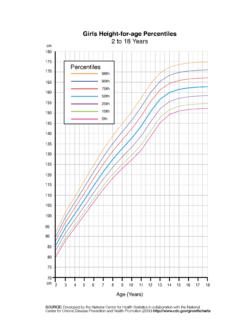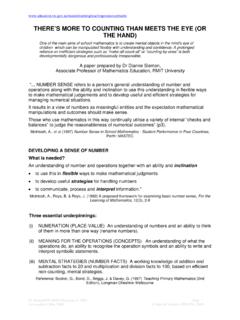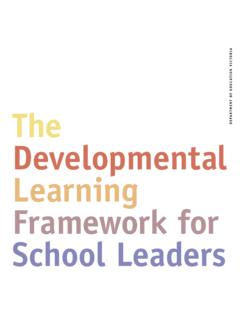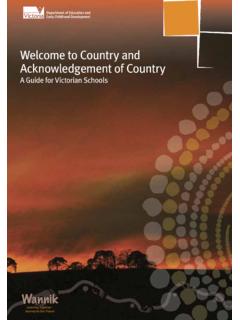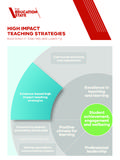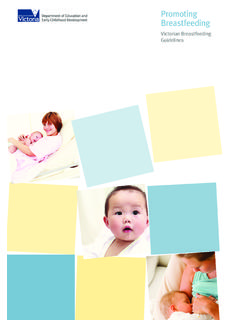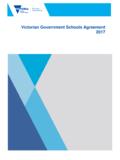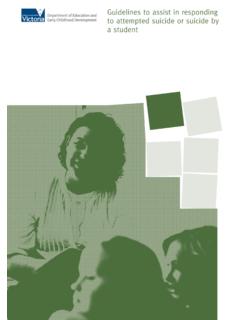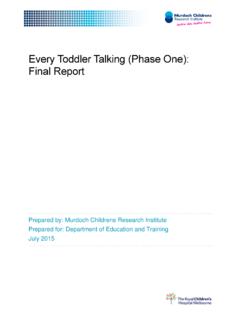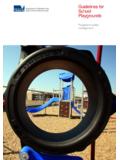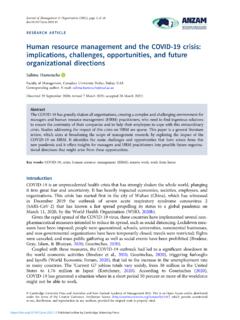Transcription of The Developmental Learning Framework for School Leaders
1 The Developmental Learning Framework for School LeadersD E PA R T M E N T O F E D U C AT I O N V I C T O R I A1 The Developmental Learning Framework for School Leaders represents a significant milestone in the Department s endeavour to support the work of Leaders . This body of work has been motivated by a strong research base that continues to confirm the influence of leadership on student outcomes and highlights the Department s commitment to building leadership capacity across the Victorian government system. It is a critical element of the Office of School Education s Learning to Lead Effective Schools strategy. Launched in 2006, the Strategy comprises:> Principal Class Performance and Development;> Principal Selection;> Learning to Lead Effective Schools: Professional Learning for Aspirant and Current School Leaders ; and> The Developmental Learning Framework for School Developmental Learning Framework for School Leaders is intended to assist teachers and School Leaders to reflect on their leadership practice, identify strengths and areas for improvement and choose appropriate professional Learning activities.
2 It can be used to enrich conversations linked to performance and development reviews between Senior Education Officers and principals, among leadership teams and staff within schools and collegiate groups across schools. It will also support self-evaluation and reflection and provide a focus for coaching and mentoring Developmental Learning Framework for School Leaders has been developed in recognition of the need to be explicit about the leadership capabilities that teachers and School Leaders require to create and sustain effective Learning environments. Importantly, it identifies Developmental pathways that will enable teachers and School Leaders to set directions for their professional Learning . Together, with an appropriate level of support, clear Developmental pathways will attract more teachers to leadership positions. It will also assist schools, regional offices and the central office of the Department to provide relevant, high quality leadership development opportunities for teachers and School Leaders .
3 By making a commitment to the Learning and growth of current and future Leaders within our system, public confidence in the quality of government School Leaders can only be strengthened. I encourage you to use The Developmental Learning Framework for School Leaders to support conversations about effective leadership in your School and inform the design of leadership development activities. Darrell FraserDeputy Secretary Office of School Education Department of EducationMarch 2007F O R E W O R D2 The notion of development is perhaps the single most important concept in education. We use other terms to describe development including growth, progress, Learning , and improvement but regardless of the term we use to describe it, the concept of individual development is the central idea underlying all teaching and Learning . Masters, 1998, p3 The major purposes of professional development are to deepen understanding, transform beliefs and assumptions, and create a stream of continuous actions that change habits and affect practice.
4 Such outcomes typically require sustained attention, study and action. Sparkes, 2003, p1R AT I O N A L EThe concept of a leadership Framework was first considered in 2004 as a component of the new Principal Class Performance and Development Process. During this early stage, work was undertaken by the Office of School Education (OSE) to map 13 core capabilities developed for the Department by the Hay Group against the Sergiovanni leadership model. Each capability was aligned with a Sergiovanni leadership domain. Towards the end of 2005, Professor Patrick Griffin from the University of Melbourne s Assessment Research Centre was engaged to assist OSE to extend and strengthen this work. Professor Griffin provided the methodology and the conceptual Framework for the project as well as the assessment and measurement expertise necessary to construct The Developmental Learning Framework for School Leaders (Leadership Framework ).
5 The primary purpose of the Leadership Framework is to build the leadership capacity of teachers and School Leaders in the Victorian government School system. It identifies and describes the critical capabilities that Leaders require to create the organisational conditions under which quality Learning and teaching takes place. Defining the essential knowledge, skills and dispositions of an effective School leader will support the development of a shared understanding of effective School leadership across the system and emphasise the importance of ongoing professional Leadership Framework describes development within five domains of leadership, distinguishing between levels of performance so that individuals can determine their current stage of development and monitor their progress over time. Thus, the potential of the Leadership Framework resides in its capacity to show where a teacher or School leader is located on a continuum and what they need to know and be able to do in order to improve.
6 Conceptualising leadership development using this approach enables the Department to provide a clear direction about what it means to develop as a leader. It also implies that leadership is learnable. In other words, while leadership is a complex and multifaceted construct, there is a body of knowledge, skills and dispositions associated with leadership that can be learned. 3 The Developmental nature of the Leadership Framework provides teachers and School Leaders with the means to set directions for their professional Learning over the long term that are appropriate to their individual development and career stages. It will provide greater clarity about the nature of professional Learning they should undertake in order to increase their level of proficiency in particular domains of leadership. While teachers and School Leaders will reflect on and self-assess their current capacity against the Leadership Framework , a custom-built 360 degree feedback survey based on the Leadership Framework will become available later in 2007 as another means of assessing their leadership capabilities and development needs.
7 The Department is tailoring its professional Learning programs to develop the capabilities described in the Leadership Framework . Schools, collegiate groups, clusters and networks, in turn, can also use the Leadership Framework to design Learning experiences that develop these capabilities. A Developmental approach involves the construction of a Framework which identifies key dimensions of development as a teacher (leader). Each of these dimensions describes and illustrates developing competence (knowledge and skill) as illuminated by research into practice. Masters, 1998, p3An important consideration in the development of the Leadership Framework was to design a resource that was applicable to teachers and School Leaders . This was based on the view that leadership is an important part of teachers practice and a critical means of supporting and sustaining School improvement.
8 Given the complex challenges associated with leadership, it should not be confined to those in Principal Class positions. Rather, leadership should be distributed and shared more widely. Effective Leaders recognise that knowledge about the challenges facing their organisation, and the expertise required to address them, can be developed or may reside with other members of the School community. Consequently, staff expertise needs to be maximised by distributing authority and responsibility throughout the School . The Leadership Framework will be of use to teachers and School Leaders regardless of the context in which they work special, primary and secondary schools; schools in metropolitan, regional and rural areas; small and large schools; and schools with diverse student populations. Schools need leadership in all five domains. However, the domains of leadership on which Leaders draw at any particular point in time are responsive to the organisational context in which the Leaders operate, and the people with whom they work.
9 Distributed leadership means multiple sources of guidance and direction, following the contours of expertise in an organisation, made coherent through a common , 2000, p15R AT I O N A L E4 LEADERSHIP CAPABILITIESW ithin each domain there are three Leadership Capabilities. The Leadership Capabilities represent the expected knowledge, skills and dispositions required for effective leadership performance. Each capability:> describes a broad expected skill or knowledge that a School leader should be able to exhibit;> is supported by a set of critical indicative tasks that need to be performed in order to demonstrate adequate and appropriate evidence of the capability; and> is unique, in that it describes an activity to be performed that is not presented elsewhere in the of the indicative tasks can be performed at varying levels of quality and it is these levels of performance quality that help to define the overall level of demonstrated is a capability?
10 The word capability carries two meanings. First, it is described as the quality of being capable, that is, of being able to do second meaning of capability is that of an undeveloped faculty or property, a condition that can be turned to use. In its first sense, capability refers to the capacity to perform the work of the profession; capability is both necessary for the performance and enables performance. In its second sense, capability can be said to provide a basis for developing future competence, including the possession of the knowledge and skills necessary for future professional work (Eraut, 1994).O R G A N I S AT I O N O F L E A D E R S H I P F R A M E W O R KTECHNICAL LEADERSHIPHUMAN LEADERSHIPCULTURAL LEADERSHIPEDUCATIONAL LEADERSHIPSYMBOLIC LEADERSHIPLEADERSHIP PROFILES Within each Leadership Domain, a set of proficiency level statements has been created to describe how a leader performs across the range of Leadership Capabilities relevant to that domain.
